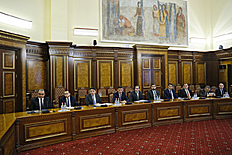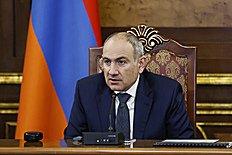Press releases
The work done in the field of digitalization and the future work plan discussed under the leadership of the Prime Minister
more 5 photos
A consultation was held today under the leadership of Prime Minister Nikol Pashinyan, during which the report on the work done in the field of digitalization in 2022-2024 and the work plan for 2025 were discussed.
Before presenting the report, the Prime Minister noted: "Today we will discuss the work we have done in the field of digitalization, and there is a specific occasion and reason for this. We have known from the beginning and still know that we have significant problems in the field of public administration or service provision. I am talking about services provided by the Government and local self-government bodies, other state bodies. And from the beginning, our understanding was that digitalization is the main tool with which we should overcome the problems we have in that field. And also recently, since many alarms have been received, not about digitalization, but about the unresolved problems in the field of public administration, it is very appropriate for us to return to this agenda again," said Nikol Pashinyan and emphasized that in this regard, greater attention should be paid to the implementation of our digitalization agenda. Summing up his speech, Nikol Pashinyan noted that it is very important to see the overall picture and understand what stage the planned work is at the moment, what resources are available to implement the digitalization agenda more effectively, and what needs to be done.
Deputy Prime Minister, Chairman of the Information Systems Management Council Mher Grigoryan, in turn, added that digitalization performs a very important function, which reveals the meaning and importance of the function and emphasized that only the functions that the citizens really need will be digitalized. According to Mher Grigoryan, there are also digital solutions that dictate the correct function and in international experience there are solutions that need to be adapted to our regulations.
Next, Nerses Yeritsyan, Secretary of the Information Systems Management Council, presented a report on digital progress. First, brief information was presented on the activities of the council during the reporting period, including sessions held, issues discussed, approved decisions and conceptual decisions.
Details were presented on the institutional role and coordination of digitalization processes, the development of draft fundamental laws on digital architecture, the new system of biometric passports and identification cards, the adoption and implementation of the “Cloud First” policy, the catalog of public data, mapping and classification, the digitization of the “12 Life Events”, etc.
Among the tasks for 2025, the availability of digital fundamentals was highlighted, whether through infrastructure or cloud solutions, the digitization of services provided under the “12 Life Events”, as defined by the Public Administration Reform Strategy, strategic communication and awareness-raising, etc.
A discussion was held on the above-mentioned report, and the participants of the meeting presented observations and recommendations on the digitization and quality improvement of public services, service delivery policy, and cybersecurity issues.
The Prime Minister instructed, guided by the digitalization roadmap, to indicate where the digitalization process is at the moment and to draw up the tasks for 2025 using the same logic, indicating the department responsible for the function. In this context, the importance of submitting periodic reports on the works done in accordance with the roadmap was emphasized. Nikol Pashinyan emphasized that draft laws will also be discussed next and in this context, the importance of intensifying cooperation with parliamentary colleagues was emphasized. Summing up his speech, the Prime Minister noted that in 2025 it is necessary to deal more intensively with the digitalization agenda, since digitalization is the key to solving many issues.







